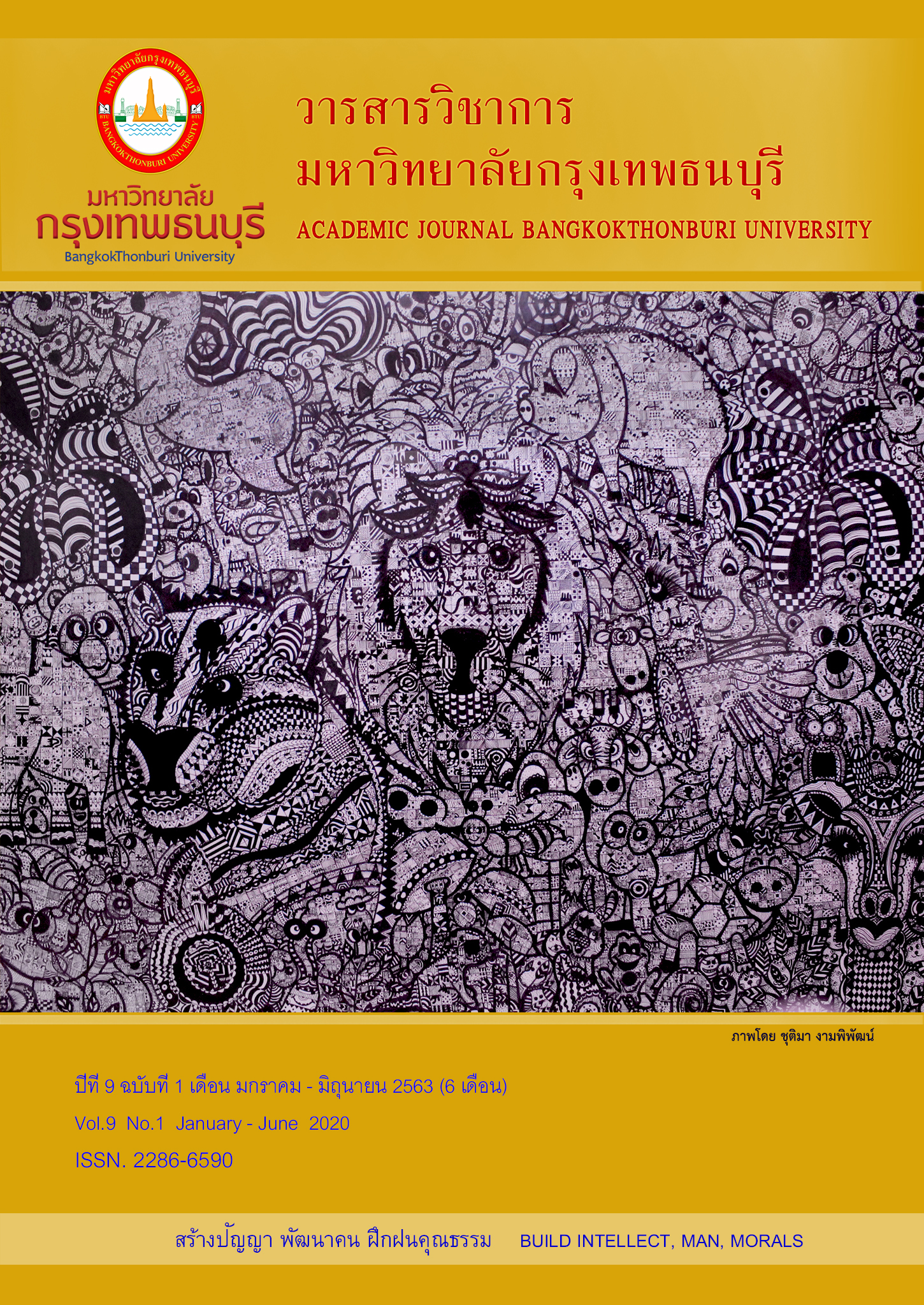The development of the potential of local organic fishery wisdom in commercial scale to connect with tourism by the community from self-reliance in the production of quality seafood to be safe and create value added.
Main Article Content
Abstract
This research project aims to study the development of organic folk wisdom to balance commercial fishing to tourism links with communities of self-reliance in the production of quality and safe seafood to create added value and lead to competion. The objectives of the study were: 1) to explore the potential and patterns of local organic fishery wisdom in Bang Chan Subdistrict, Khlung District, Chanthaburi Province and; 2) to study the process of developing the potential of local organic fishery wisdom in the management of household accounting for production costs; storage costs setting the sales price accounting system and financial of local organic fishery to be able to expand commercially. The needed data were collected by using the interview method and organizing a workshop for local fishermen of Bangchan Subdistrict. The sample comprised 400 people they analyzed the potential of local organic fishery wisdom in Bangchan Subdistrict. The results of the study showed the following facts:
1. The household members of Bangchan local fishery were 4 people. The majority of the fishery laborers were 2 people. The type of fishery that is obtained from local fishery was mainly cockle, organic fish, grouper fish, koala fish and squid. The average amount of fish caught at a time was most likely uncertain. Natural cost sources were in a cost deteriorated state. The wisdom of folk fishery was passed down from generation to generation. The cost of processing wisdom of local fishery was extended to community tourism in the homestay business. Outstanding in fishing wisdom was the invention of fishing tools for themselves. Fishing is natural, seasonal, tidal and windy waves, and most importantly, fishing was based on the way of catching animals. All practices were in line with the life cycle of aquatic animals in natural resources in the community.
2. The bookkeeping wisdom created a path towards the future of Bangchan local fishery in the overall level. There was a need for training to learn household accounting at a high level. After the workshop the process of household accounting for local fisheries and tourism business operators in the homestay community came into existence. Most of them were well-informed and able to practice household accounting methods payment, writing, professional expenses such as fuel, fishery tools, fish species, oil. Holistically the problems and obstacles in bookkeeping of Bangchan local fishery were found to be at a medium level.
Article Details
References
กฤษฎา บุญชัย. (2555). นิเวศวิทยากับการเมือง. ใน รายงานโครงการสัมมนาเชิงปฏิบัติการ หัวข้อ การใช้ทฤษฎีสังคมศาสตร์อธิบายความไม่เป็นธรรมทางสังคม วันที่ 30 มิถุนายน – 1 กรกฎาคม 2555. กรุงเทพฯ.
กรมควบคุมมลพิษ กระทรวงทรัพยากรธรรมชาติและสิ่งแวดล้อม สำนักจัดการคุณภาพน้ำ. (2548). แนวปฏิบัติที่ดีด้านการป้องกันและลดมลพิษ อุตสาหกรรมอาหารทะเลแช่เยือกแข็ง: ประเภทปลา. นนทบุรี: กรมควบคุมมลพิษ กระทรวงทรัพยากรธรรมชาติและสิ่งแวดล้อม.
คำสั่งคณะรักษาความสงบแห่งชาติ. (2558). เรื่อง การแก้ไขปัญหาการทำการประมงผิดกฎหมาย ขาดการแก้ไขรายงานและไร้การควบคุม. ราชกิจจานุเบกษา เล่ม 132 ตอนพิเศษ 99 ง หน้า 5-6 (29 เมษายน).
ชนิดาภา ดีสุข และคณะ. (2556). บัญชีครัวเรือนเพื่อชุมชนตามปรัชญาเศรษฐกิจพอเพียง. กรุงเทพมหานคร: มหาวิทยาลัยกรุงเทพธนบุรี.
สุภัทรษร ทวีจันทร์. (2556). การบูรณาการบัญชีครัวเรือนเพื่อเสริมสร้างภูมิปัญญาทางบัญชีตามหลักปรัชญาของเศรษฐกิจพอเพียง: กรณีศึกษาชุมชนบ้านกลาง ตำบลขะยูงอำเภออุทุมพรพิสัย จังหวัดศรีสะเกษ. มหาวิทยาลัยราชภัฏศรีสะเกษ.
สุวัฒน์ หม่นมั่น. (2551). ศึกษาภูมิปัญญานิเวศวิทยาชาวประมงพื้นบ้านกับการจัดการจัดการทรัพยากรชายฝั่งทะเล :กรณีศึกษาประมงพื้นบ้าน ตำบลลีเล็ด อำเภอพุนพิน จังหวัดสุราษฎร์ธานี. วิทยานิพนธ์สังคมวิทยาศาสตรมหาบัณฑิต สาขาวิชาการจัดการสิ่งแวดล้อม. สถาบันบัณฑิตพัฒนบริหารศาสตร์.


